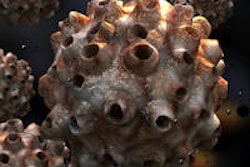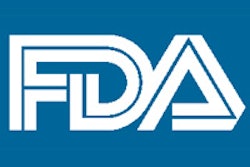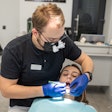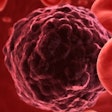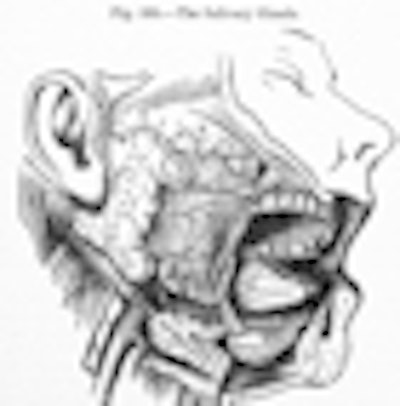
A rapid rise in the rate of oropharyngeal cancer among men is being linked to human papillomavirus (HPV), and the number of cases in the U.S. could increase by almost 30% by 2020, surpassing the number of cervical cancers in women, according to research presented June 3 at the American Society of Clinical Oncology annual meeting in Chicago.
There were approximately 6,700 cases of HPV-positive oropharyngeal cancers in the U.S. in 2010 -- up from about 4,000 in 2004 -- and the number of cases is projected to rise by 27% to 8,500 in 2020, lead researcher Anil Chaturvedi, PhD, of the National Cancer Institute (NCI), told DrBicuspid.com.
Using data from the NCI's cancer registries surveillance programs in Hawaii, Iowa, and Los Angeles, Chaturvedi and his co-authors determined the HPV status for a total of 271 oropharyngeal cancer cases reported between 1984 and 2004. They estimated trends in HPV prevalence across four calendar periods using logistic regression and found that the incidence of HPV-positive oropharyngeal cancer in men rose by 225% between 1988 and 2004.
— Anil Chaturvedi, PhD, National Cancer
Institute researcher
Chaturvedi echoed other oral cancer specialists who attribute the sharp rise in such cancers to an increasing prevalence of oral sex.
"We hypothesize that the increase is due to changes in sexual behavior over time," he said, "and increased oral sex behavior has led to an increase in oral HPV infections, which led to increases in HPV-positive oropharyngeal cancers."
Recent studies indicate that deep mouth (French) kissing is associated with the presence of oral HPV infections, suggesting that mouth-to-mouth transmission is plausible. But the predominant mode of transmission is through oral sex, Chaturvedi said.
The growing rate of HPV-related oral cancers is not just a concern in the U.S., he added, noting that studies in Sweden, Canada, Denmark, and Australia have reported similar increases.
"I wouldn't call it a worldwide phenomenon, but it certainly seems like a developed country phenomenon resulting from a wave of changes in sexual mores," Chaturvedi said.
Survival rates
He and his co-authors also found that survival rates were significantly greater for HPV-positive versus HPV-negative cases. In addition, the difference in survival between HPV-positive and HPV-negative cases was greater for those patients who were treated with radiation therapy.
While it's not entirely clear why the survival rates differ, scientists believe it's related to the type of tumors that result from HPV, Chaturvedi noted.
"Tumors caused by HPV infection tend to have less genetic damage than HPV-negative tumors, which enhances response to treatments," he said. "We think one of the reasons for improving survival for HPV-positive patients again underscores the enhanced sensitivity of these tumors to chemoradiation therapy."
Radiation delivery methods have also improved, Chaturvedi pointed out. Concurrent chemoradiation therapy has been the norm for treatment of oropharyngeal cancers since 1999.
Also unclear is why more men are contracting these cancers than women, he noted.
"We don't know if it is explained by rates of infection in men versus women or if they're explained by patterns of sexual behaviors, or there might be something biologically different," Chaturvedi said. "So they remain active areas of investigation."
Since HPV-positive oropharyngeal cancers are growing at an alarming rate among men, shouldn't HPV vaccines also be recommended for young men, not just young girls?
According to Chaturvedi, more study is needed before such a recommendation is warranted -- an opinion shared by many cancer researchers.
"We don't have any data so far to show that the vaccine can prevent oral HPV infections," he noted. "Based on what we know about how the vaccine works, there are reasons to believe that it will have efficacy in preventing oral HPV infections, but those studies have not been published."
None of the vaccine trials has addressed the question of oral HPV infection, only cervical and infections of the sexual organs, Chaturvedi added.
The escalating incidence of HPV-related oral cancers, particularly after Michael Douglas' recent battle with oropharyngeal cancer, has increased awareness among medical professionals and the public about the disease, he noted. But it is still difficult to discern in the early stages.
"There are as yet no known precancerous lesions associated with the oropharyngeal cancers caused by HPV infection, so there isn't a defined clinical precursor lesion that would show evidence of it," Chaturvedi noted.
Further studies into the history and progression of the disease will help with diagnosis and treatment, he added.
"We know from several studies over the last couple of decades that the persistence of HPV infection is one of strongest risk factors for progression to cancer," Chaturvedi said. "But we don't know the natural history of the infection -- how many infections persist, and how many infections clear."




